Anti-Fascist Resistance
24 February 2024
UNICEPE, Porto
Overview
SolRem’s Memory Forums aims to educate and raise awareness about the history of resistance and solidarity against fascism, right-wing authoritarianism and dictatorships. This Memory Forum focused on the anti-fascist resistance against the Estado Novo and the defense of that memory and example at a time when the extreme right is gaining more and more electoral and social weight in Portugal. The different approaches brought by the eight speakers – seven representing associations dedicated to the defense of the memory of the resistance to fascism, women’s rights, peace, culture and knowledge as an instrument of democracy and the legacy of the Portuguese democratic revolution and one recognized academic in the study of fascism and the resistance to it – created the opportunity to provide a dense and problematising view of the phenomenon of anti-fascist resistance. It also provided a very vivid description of a reality that is little studied in a school context and which affected the lives of many of their ancestors.
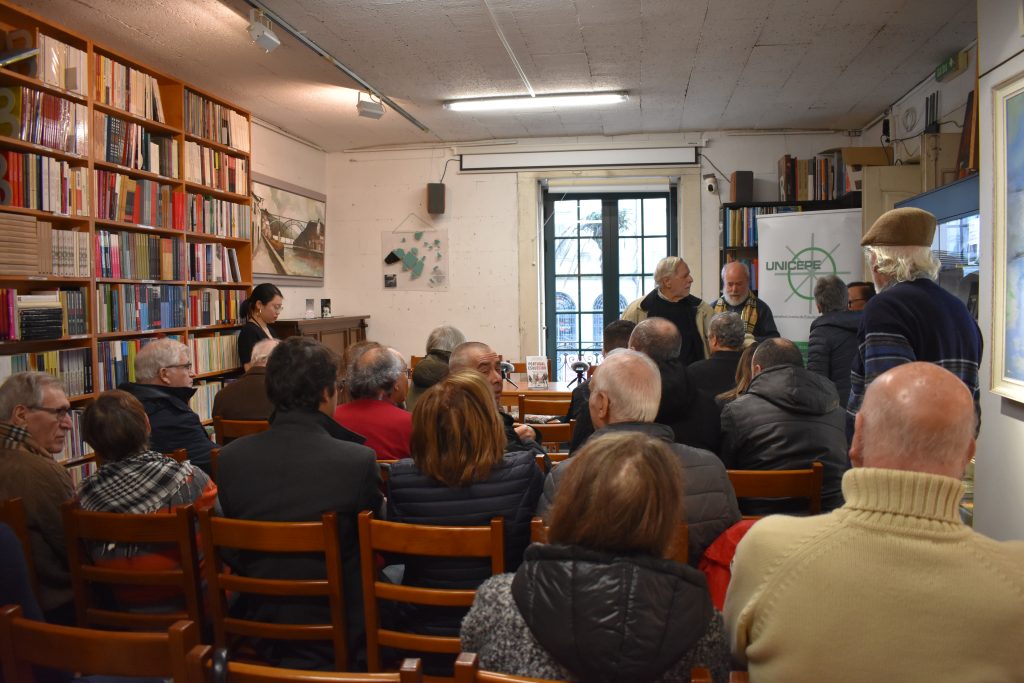
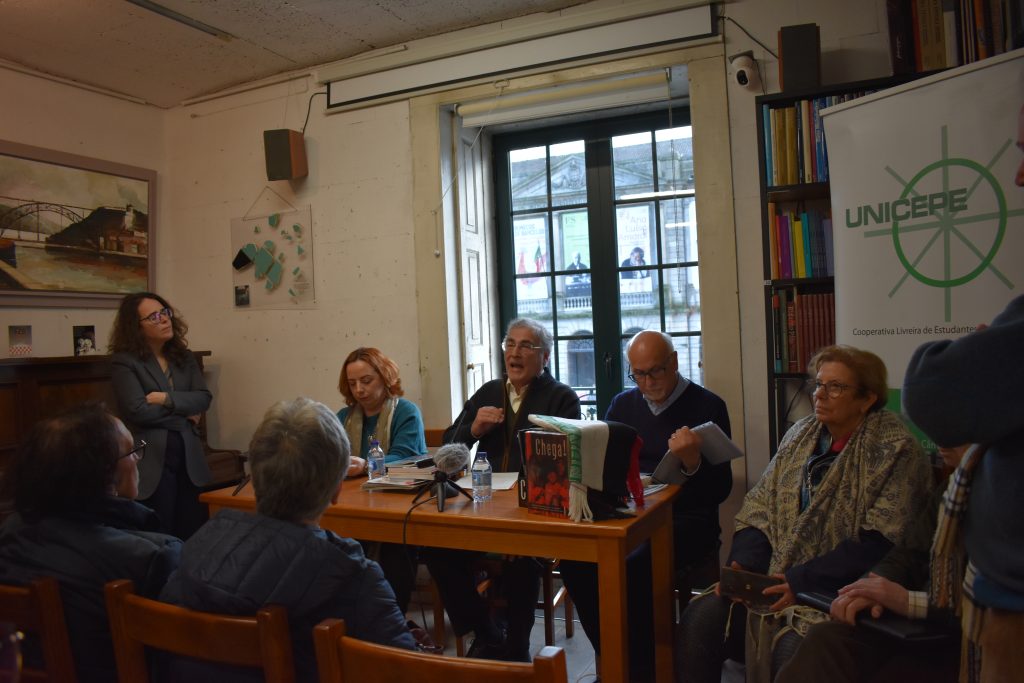
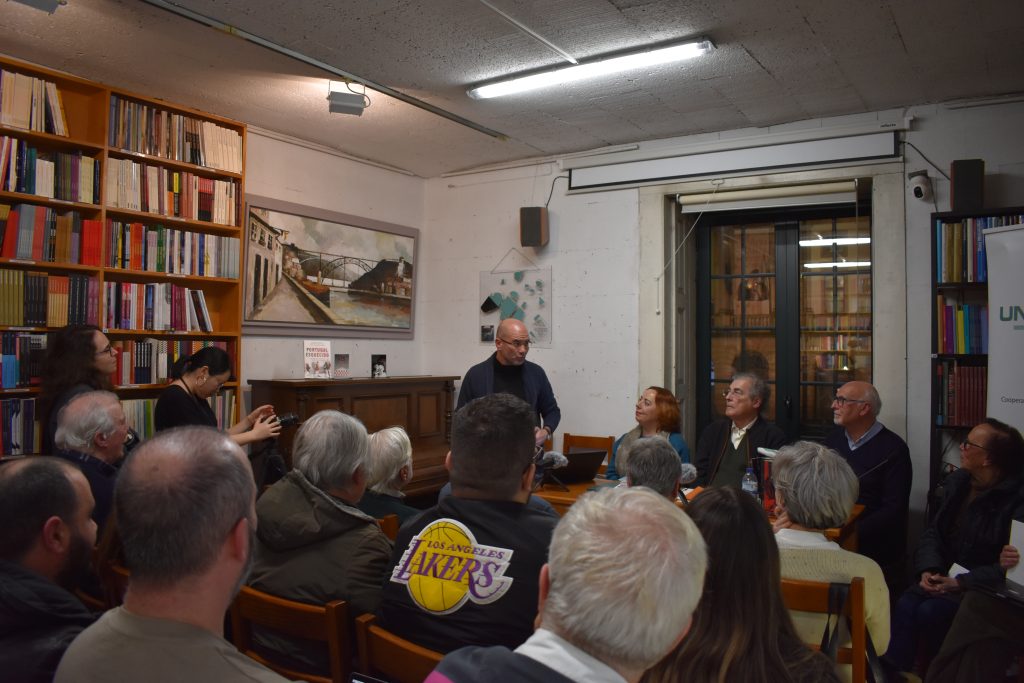
The event took place at Unicepe, Porto, on the 24th of February 2024. Unicepe (Porto Student’s Book Cooperative) was founded in 1963 in the wake of the 1962 student uprising and which, since its inception, was deeply linked to the anti-fascist resistance, namely through the sale of books, both Portuguese and foreign, banned by the censorship. It aimed to fulfil the purpose of preserving the memory of anti-fascist resistance and of those who fought it in the time of the Portuguese dictatorship.
There were 42 people in the audience engaging in the discussion and debate of the topic of anti-fascist resistance.
Agenda
| 24th February 2024 – 17:00-20:00 |
| Opening of the Memory Forum: Anti-Fascist Resistance Ana Catarina Caldeira, IMCultural |
| Testimonies from associations related to the defence and appreciation of the memory of resistance to fascism, women’s rights, culture and knowledge as a form of resistance, peace and the legacy of the Portuguese democratic revolution:Associação Conquistas da Revolução (Association Conquests of the Revolution): Jorge SarabandoConselho Português para a Paz e Cooperação (Portuguese Council for Peace and Cooperation): Ilda FigueiredoMovimento Cívico Não Apaguem a Memória (Don’t Erase the Memory Civic Movement): José CastroUnião de Mulheres Alternativa e Resposta (Alternative and Response Women’s Union): Frederica ArmadaUnião dos Resistentes Antifascistas Portugueses (Union of Portuguese Anti-Fascist Resistants): Maria José RibeiroUNICEPE (Porto Student’s Book Cooperative): Rui Vaz PintoUniversidade Popular do Porto (Popular University of Porto): Sérgio Vinagre |
| Commentary on memory forum: Manuel Loff (UPORTO/IHC-In2Past) |
Contributions
Anti-Fascist Resistance in Portugal and the challenges that the far right poses to democracy today
The Memory Forum on the anti-fascist resistance in Portugal, the defence of its memory today and the dangers to democracy posed by the extreme right was based, above all, on the sharing of testimonies from representatives of seven associations related to the field of memory of the resistance to fascism, the defence of women’s rights, the defence of peace, the defence of culture and knowledge as instruments at the service of democratic societies and the defence of the legacy of the Portuguese democratic revolution. In addition to the seven associations that actually attended and testified at the session, two others had confirmed their interest in taking part but were forced to miss out due to unforeseen circumstances at the last minute. In this case, the Associação de Jornalistas e Homens de Letras do Porto (Association of Journalists and Men of Letters of Porto) – a crucial cultural association in the city – and the Teatro Experimental do Porto (Experimental Theatre of Porto) – one of the city’s oldest theatre companies with a long history of anti-fascist resistance – were unable to attend.
The Association Conquests of the Revolution, a nationwide organisation represented at this session by Jorge Sarabando, highlighted the importance of the revolution and its legacy in terms of rights, freedoms and guarantees. He also highlighted the efforts that have been made over the last 50 years to reverse or diminish many of the achievements made by the Portuguese population between 1974 and 1976 while never failing to value the importance of the Constitution of the Portuguese Republic, approved on 2 April 1976, as the central repository and guarantor of these rights. Like all the representatives of the other associations, they pointed out the danger that the spirit and values of April face given the very significant growth of the Portuguese far right, which the polls on the legislative elections on 10 March 2024 seem to confirm.
The Portuguese Council for Peace and Cooperation, a national organisation represented at this session by Ilda Figueiredo, highlighted the anti-imperialist, anti-military-political bloc and pacifist nature of the Portuguese Constitution. She also stressed that the Portuguese Revolution was also about peace, with the main aim of ending the colonial war in Africa and recognising the right to self-determination and independence of the peoples colonised by Portugal. Finally, in a world where tensions, conflicts and wars seem increasingly significant, the ideal of peace and cooperation was pointed out as the only one capable of halting the escalation of violence that threatens to dominate the entire world.
The Don’t Erase the Memory Civic Movement, a nationwide organisation represented at the session by José Castro, underlined the institution’s umbilical link to defending the memory of the resistance to the fascist dictatorship. When the state was preparing to sell the former prison and headquarters of the political police (PVDE/PIDE/DGS) in Lisbon (Aljube) to be converted into a tourist resort, a group of anti-fascist resisters got together to collect a petition that would not only prevent this transaction but would also impose the installation of a museum of resistance and freedom, which would happen in 2015. Later, and in a similar situation to the Aljube, members of this association, URAP – which also took part in the Memory Forum – and civil society joined forces so that one of the most emblematic political prisons of Portuguese fascism (the Peniche Fort) would not be turned into a tourist attraction – as was planned – but would be converted into a museum dedicated to the history and memory of the anti-fascist resistance. Finally, they gave an account of their efforts to ensure the creation of a museum of resistance to fascism in Porto.
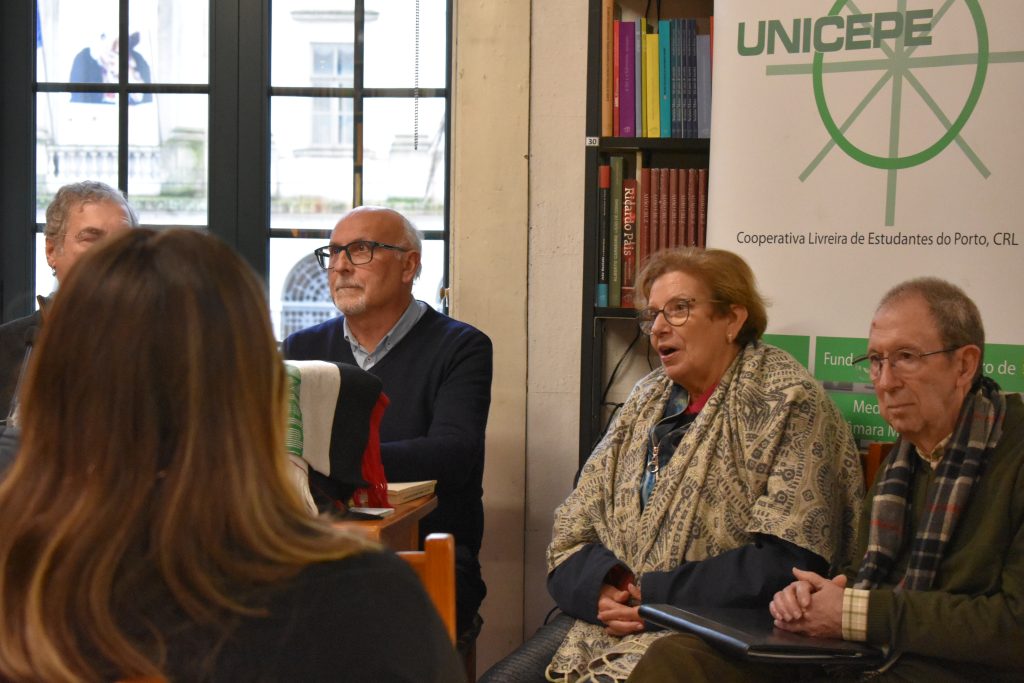
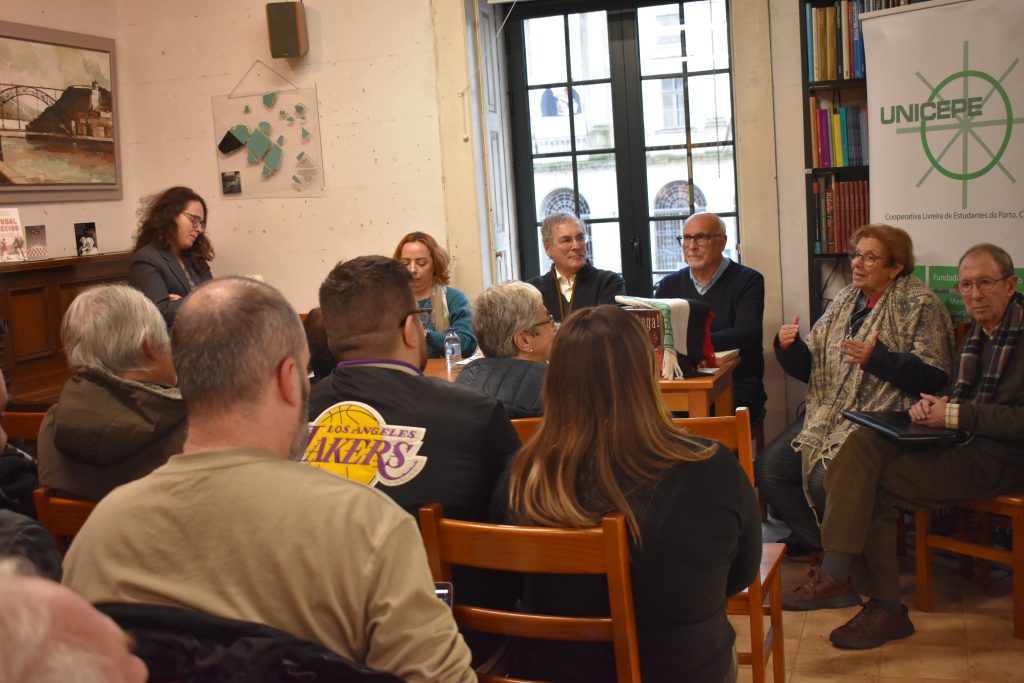
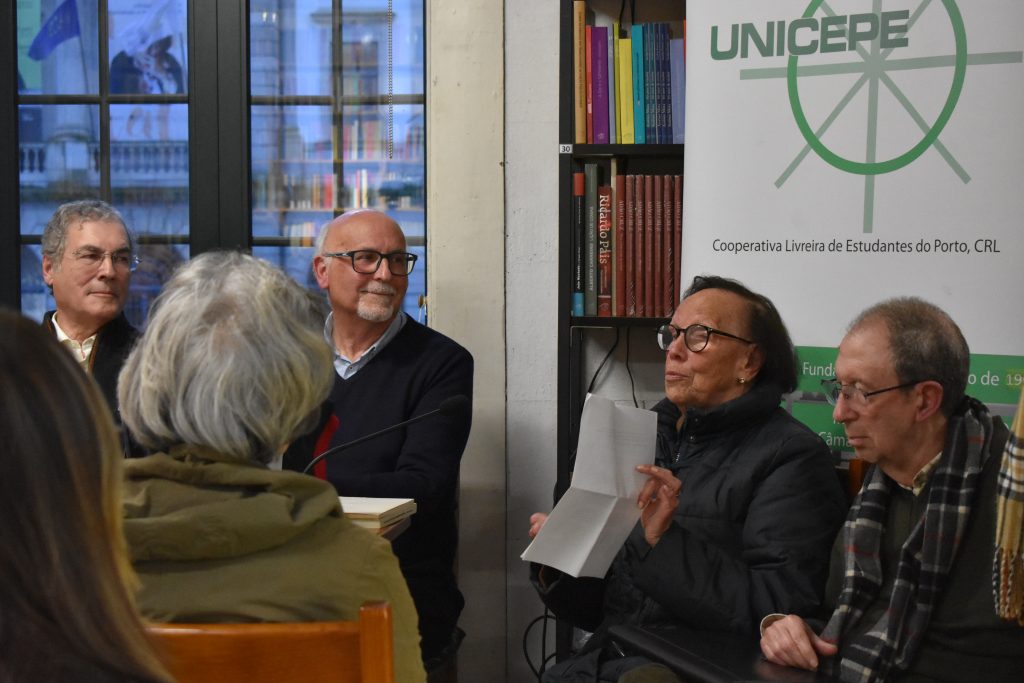
The Alternative and Response Women’s Union, a nationwide organisation represented at this session by Frederica Armada, began by describing the situation in which fascism consigned Portuguese women, depriving them of fundamental rights and dignity. She also showed how the political police were particularly violent and sadistic in their detention and torture of women. She highlighted the wide range of rights that the April Revolution and the resulting Constitution enshrined for women and the path that, since then, the Portuguese feminist movement has taken towards extending and deepening these rights, highlighting the complex and protracted struggle to decriminalise voluntary interruption of pregnancy. Finally, she said that the exponential growth of the extreme right is threatening not only the legacy of April and anti-fascism but, above all, women’s rights and freedoms.
The Union of Portuguese Anti-Fascist Resistants, a nationwide organisation represented at this session by Maria José Ribeiro, stressed the importance of having been the first association to defend the legacy of resistance to fascism to be set up in the country. It also emphasised its participation in all actions aimed at preserving and enhancing the memory of the resistance and, like the Don’t Erase the Memory Civic Movement, it highlighted the fight to install museums dedicated to the memory of the resistance to fascism in the former headquarters of the political police in Lisbon, in the Peniche fort and, more recently, in the city of Porto.
UNICEPE, a local book cooperative represented at this session by its president, Rui Vaz Pinto, highlighted the fact that it was created in the wake of the 1962 student revolt and that it emerged as a student cooperative that sought to sell books, both Portuguese and foreign, banned by censorship. This activity led to regular interventions by the political police on the cooperative’s premises and persecution and investigations into its prominent leaders. Given the threats facing democracy today, the cooperative says its mission is more topical than ever, seeing books and knowledge as one of the main instruments in the fight against fascism and post-fascism.
The Popular University of Porto, a local organisation represented at this session by its president, Sérgio Vinagre, began by pointing out that the model of the popular university it has adopted was inspired by the one formulated by the important Portuguese anti-fascist resistance fighter Bento Jesus Caraça. The People’s University aims to bring knowledge to the entire population and offers a wide range of courses annually to anyone interested. In this context, it has already organised several courses on fascism, anti-fascist resistance, the April Revolution, and its political, social, economic and cultural legacy. Also, as part of its activities, the institution – in collaboration with academics and history students – has endeavoured to collect dozens of testimonies from workers who, even during the Estado Novo, were somehow involved in the fight against the regime and for trade union freedom.
Finally, Professor Manuel Loff gave a speech that, based on the experience of resistance to fascism in Portugal, sought to establish the parallels and differences between the Portuguese anti-fascist resistance and that which existed in Spain, France, or Italy. He also briefly characterised the Estado Novo, placing it within the broader framework of international historical fascism between the wars. He ended by addressing the concerns expressed by all the speakers about the upcoming legislative elections and the prospect of a substantial electoral strengthening of the far right.
Conclusions
The Memory Forum Anti-Fascist Resistance provided an informed environment for the exchange of knowledge and experiences related to the subject in question.
In general terms, the audience was receptive to the discussion and in agreement with the ideas exchanged in the session. In this sense, this reflects that more conversations should be held about the topic of anti-fascist resistance.
